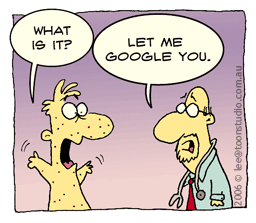According to a WSJ blog post two years ago, it mentioned and asked, “By now, it’s well known that almost anyone you meet — from a potential employer to a prospective date — might be searching for information about you online. But would you feel strange knowing that your doctor was Googling you?” The blog post goes on to say “The practice appears to be widespread, according to an essay in the latest edition of the Harvard Review of Psychiatry, and it raises some thorny ethical questions for doctors, particularly those dealing with mental health.”
Some folks actually wrote a paper on this. I happen to come across this news from KevinMD who made mention of this on his site in April of 2010 in a post entitled “Should doctors Google their patients?“
Point is, apparently I am not the first one to think of this, do it or subsequently write about it, but here is my response.
As a physician/pathologist there are a number of forms of data available to you, specimen requisition information, clinical history, electronic medical records, laboratory tests, radiology studies, operative notes, etc…
 In some cases, the information may not be available (brunt of work-up, radiology, pre-operative visit, etc…) performed outside your institution where these impressions and results may normally be available to you. The specimen requisition may simply state “change in bowel habits” or “liver mass” without much more than patient name, age, sex and a MRN of little value beyond appropriate patient ID. No radiology, laboratories, physical examination findings, incomplete operative note and/or a clinician/surgeon who did not perform anything beyond the endoscopy or operation and does not recall by phone 2 or 3 days after the “case” anything about medication history, social history, radiology from outside hospital or post-operative course (assumingly these are all “negative”, “non-contributory” or “not worth remembering”. When one calls for additional information the question is usually answered in the form of another question “Is it cancer?”, “Is the margin negative?”, or “How many lymph nodes are involved?”
In some cases, the information may not be available (brunt of work-up, radiology, pre-operative visit, etc…) performed outside your institution where these impressions and results may normally be available to you. The specimen requisition may simply state “change in bowel habits” or “liver mass” without much more than patient name, age, sex and a MRN of little value beyond appropriate patient ID. No radiology, laboratories, physical examination findings, incomplete operative note and/or a clinician/surgeon who did not perform anything beyond the endoscopy or operation and does not recall by phone 2 or 3 days after the “case” anything about medication history, social history, radiology from outside hospital or post-operative course (assumingly these are all “negative”, “non-contributory” or “not worth remembering”. When one calls for additional information the question is usually answered in the form of another question “Is it cancer?”, “Is the margin negative?”, or “How many lymph nodes are involved?”
A recent “liver tumor” submitted by a private physician at our hospital, where the work-up was largely done elsewhere, including pre-operative screening and imaging had an unusual histology. No additional information was available. A call to the surgeon about occupation, social history and medication history was met with one response “Is the margin negative?” If I didn’t tell him the patient’s first name he would not have known that either.
Google did. And where he worked (irrelevant) what his “Likes” were, hobbies, interests and favorite TV shows. The data I saw did not necessarily help to replace the normally present clinical data (assuming accurate when it is available), did not make the diagnosis less or more likely by itself, assuming the infomation online was accurate (i.e. did I have the right “John Doe”) but it did help to substantiate the findings, albeit given circumstantial data.
As KevinMD and the WSJ blog notes and reader comments mention, there are many issues with this. For some physicians apparently, using Google and the Internet to find publicly available information about their patients may shed some light into their diagnoses or management.
One physician commented “I’ve done it, and it yielded invaluable info on a sick non-psych patient. Nailed the diagnosis.”
What if there is something “out there” about an overtly litiginous patient? Or one who smokes, is an admitted alcoholic, brags about excessive BMI, has started a blog on his/her personal battle with cancer, could any of these influence your diagnosis or approach after finding out?
Perhaps in some cases and that is the point – shouldn’t you know to help the patient and providers?
I have yet to meet a hepatologist who has not googled the name of a drug, prescription, over-the-counter or “other” health food store variety to look up any reports of hepatotoxicity or chemical compunds in those drugs that have been associated with hepatotoxicity.
An old cardiologist (older now) told me as a first-year medical student, “Keith, there are two keys to practicing medicine; 1. Do everything the same way, everytime. This lowers the likelihood you will miss something. Whether it is a taking a clinical history, physical exam, reading an EKG, reading a chest x-ray (from outside in, or inside out, top-down, down-up), however you choose to do it, do it the same way everytime. And 2. Cheat. Cheat all the time. Meaning get as much information as you possibly can. MD stands for medical detective. Get information from as many sources as possible.
This was shortly before Ask Jeeves or Yahoo!
I wonder what he would do if he had Google and an unresponsive patient, missing clinical information, radiology studies, unresponsive surgeon, forgetful clinician, etc…
Does this replace physician communication, documentation, the EMR, solid clinical business practices, actually talking to the patient, looking at his/her medical records, the slide(s) or X-rays? Of course not. May it yield information not mentioned and potentially useful? Ask Google.

































